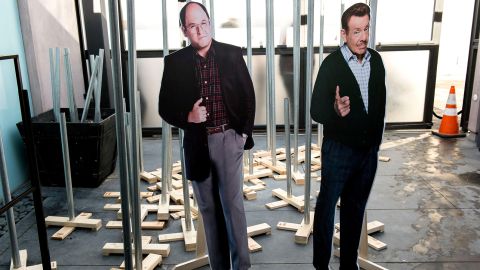CNN
—
For those who may find it hard to get some holiday cheer this year, there’s an alternative to the hall’s merry deck. You have options.
That’s right, there is Festivus.
December 23rd is Festivus. This is a day reserved in history for everyone who feels that the usual holiday traditions don’t quite fit the bill this year.
Festivus is a special holiday reserved in the pre-pandemic era for those who tend to embrace their inner ‘buzz’ rather than the spirit of Christmas. There may be more people in that camp than ever before, and the antidote, or at least the outlet that could bring catharsis to us this year, is Festivus.
Festivus is reminiscent of the sitcoms from years ago. The Farce Holiday was born on December 18, 1997 in the television show Seinfeld. That’s when George Costanza, played by Jason Alexander, reveals that his father (the late Jerry Stiller, played by Jerry Stiller) created the day to contrast religious and commercial aspects. Traditional he holiday in December. Jerry, the protagonist of the show of the same name, which aired on NBC from July 5, 1989 to May 14, 1998 and aired for nine seasons and 180 episodes, his Seinfeld, celebrates the holidays and its peculiar I am interested in rituals.
Strictly speaking, Festivus’ roots can be traced back to 1966. This is when Seinfeld writer Dan O’Keeffe, who introduced Festivus into the plotline, first heard his father dreaming of the holidays.
“Festival for the rest of us!” is the tagline that caught like wildfire following the episode.
The holiday is completed with a set of traditions befitting this third year of the pandemic, including drab poles instead of brightly lit trees, and misery otherwise. also requires a special ritual known as “broadcasting grievances.” If “Seinfeld” is still producing new episodes, they’ll probably expand his Festivus parameters so he can complain about the pandemic and all the other upsides in life. .
I, for example, happily gather around scrap salvaged poles and complain out of my head. It makes me feel good just to think of all the complaints about announcing 2022 in one fell swoop in the name of Festivus.

And I hope you feel better, that your family is safe, and that your toddler has more fun tearing up the wrapper and playing with boxes of toys that took forever to arrive. increase.
I know broadcasting my grievances can be cathartic, but like too many things, complaining too much may not be very good for me.
When celebrating Festivus, “The trick to doing this in an emotionally healthy way is to distinguish between two types of grievances: the ones we can’t do anything about, and the ones we actually want to fix,” says the New York-based firm. Renowned clinical psychologist Guy Winch said, Follow me via email as Dear Guy at TED and co-host of the Dear Therapists Podcast.
If your complaint is about something out of your control, such as not being able to see your loved ones, or go to the latest movie or go out to eat, say, “By all means, stand around that pole and ventilate.” Winch said.
But if you can keep your grievances in check to some extent, yelling at a ragged pole while others listen may not be the answer. Choose or yell into the abyss, but the tensions and fights that can ruin a nice (tongued) celebration of pettyness, misery, whining, and being a victim don’t produce ,” said Winch.
According to Tina Gilbertson, a Denver-based psychotherapist and author of Constructive Wallowing: How to Beat Bad Feelings by Letting Yourself Have They, just complaining doesn’t help.
“Having public grievances is only half the battle when it comes to feeling better,” she said. For example, if you say, “I hate being stuck at home,” you can say, “Yes! Feeling stuck at home is awful. We need witnesses with

For those who really want to get into the letter of Festivus law, Paul and complaints are followed by attempts to track down literally everyone around you. It can be cathartic to relieve excess tension.
Now put up a pole and complain. Even George Costanza’s father smiled at times, so if possible, leave a little room for the positive.

